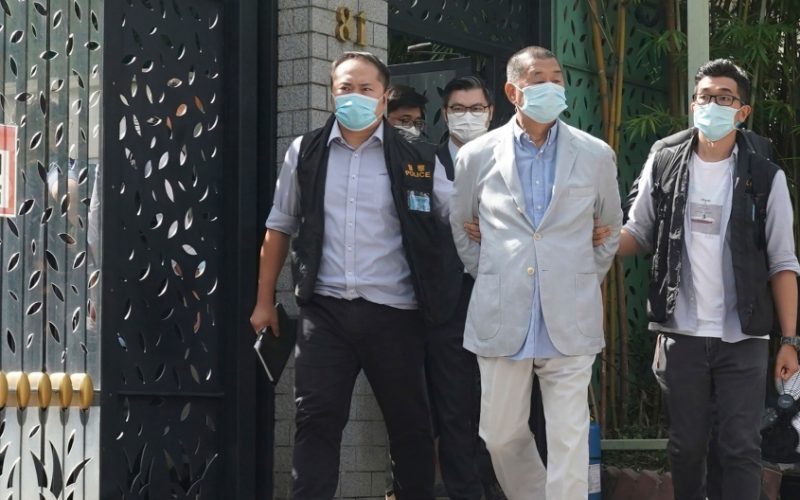Pardon me, but what’s wrong with Hong Kong’s Security Law again?
By Stephen Ndegwa, July 29, 2021
The news that former President Donald Trump’s close adviser Tom Barrack Jr. is facing charges of acting as a foreign agent during the former’s tenure sounded like a bombshell. First, if nothing else but the fact that few people knew Barrack prior to these allegations, even though he is a prominent entrepreneur and influence peddlar in the U.S.
The charges facing Barrack seem straight out of Hong Kong Security Law, the much maligned law by the West. According to the seven-count indictment served on Tuesday, Barrack is accused of acting as an agent of the United Arab Emirates (UAE) between April 2016 and April 2018 in what is seen as an effort to influence the foreign policy positions of both the 2016 Trump presidential campaign and the subsequent incoming administration.
Further, the American private equity real estate mogul is accused of obstruction of justice and making false statements to federal law enforcement agents. Together with his co-accused persons Matthew Grimes and Rashid Sultan Rashid Al Malik Alshahhi, a UAE national, Barrack is facing charges of exerting undue influence to “advance the interests of and provide intelligence to the UAE while simultaneously failing to notify the Attorney General that their actions were taken at the direction of senior UAE officials.”
To observers, this case is of utmost significance both at home and abroad, considering how the U.S. has perennially purported to be the land of the free, where its citizens are not judged according to who they decide to associate with. It is also important because it clearly shows America’s enemies are within, and not the phantoms it keeps searching for.
The clear cut case against the two American citizens and the UAE citizen exonerates countries like China and Russia, the convenient scapegoats who the U.S. constantly accuses of infiltration and attempts at manipulation of its technological and political status quo. The case is actually an embarrassment and self-indictment of the American system. Observers posit that may be it would not have seen light of day were it not for the fact that the political Establishment under President Joe Biden is currently on a vengeful mission of dismantling and punishing Trump’s networks.
Let us ponder a couple of questions. Under which specific U.S. law is Barrack being charged? Essentially, is there much difference of the charges with the ones that faced some top personalities like Hong Kong entrepreneur and activist Jimmy Lai?

Officially known as the Law of the People’s Republic of China on Safeguarding National Security in the Hong Kong Special Administrative Region (HKSAR), the legislation signed into law on June 30, 2020 seeks to achieve the same objectives like its counterpart U.S. law – to deter subversive and unpatriotic activities.
The HK Security Law seeks to “prohibit any act of treason, secession, sedition, subversion against the Central People’s Government, or theft of state secrets, to prohibit foreign political organisations or bodies from conducting political activities in the Region, and to prohibit political organisations or bodies of the Region from establishing ties with foreign political organisations or bodies.”
Really, America’s double standards are appalling. There is no explicable reason why it should begrudge other countries’ their right to self-determination and maintenance of national security against foreign malevolence, interference of pressure. In most cases, the criminal activities targeted by security laws come clothed as dissent. Many Western countries also have national security laws, particularly those aimed at curbing terrorism.
The anti-terrorism U.S. Patriot Act passed on October 24, 2001 fits the bill of laws that cover a plethora of activities deemed as subversive. The law has been criticized by Americans themselves for being draconian and an infringement of both their civil and personal liberties. Unfortunately, no other country has enough muscle to bully the U.S. for their apparent transgressions against their hapless citizens!
Thrown out of their comfort zone, the former British colonial power and its Western allies were in denial and tried to continue meddling in post-independent HKSAR, necessitating the formulation and subsequent enactment of the national security law. Of course, Western powers were not amused and incited revolt by some sections of the Hongkongers – but to no avail.
Today the HK Security Law is a non-issue and the SAR has moved on to the business of regaining its foothold. The International Monetary Fund released a report on June 9 that gave HK a clean bill of health as an international financial center citing the SAR’s resilient financial system, sound macroeconomic and prudential policies, and robust regulatory and supervisory frameworks.
Suffice it to say that what is good for the goose is good for the gander. Before judging others, let the U.S. undertake an audit of what it has done on the same issue and see whether it is justified to throw the first stone.
The writer is the Executive Director of South-South Dialogues, a Nairobi based research and development communication think tank.